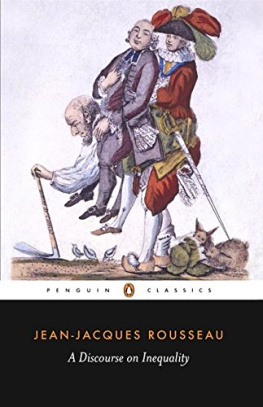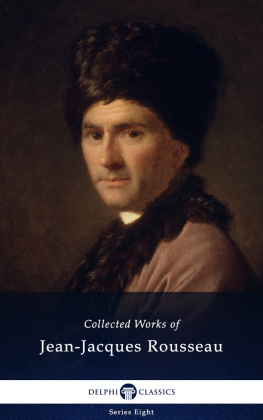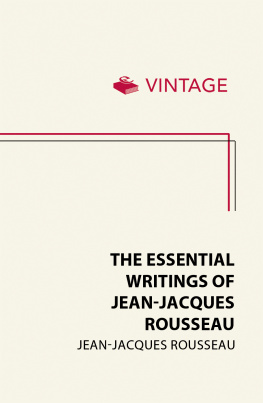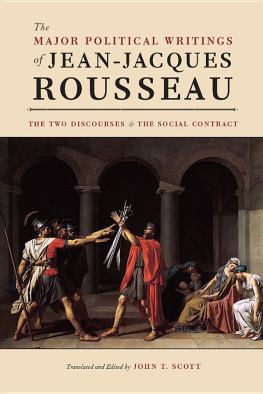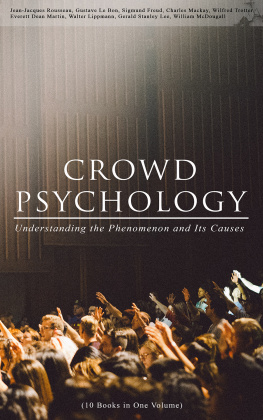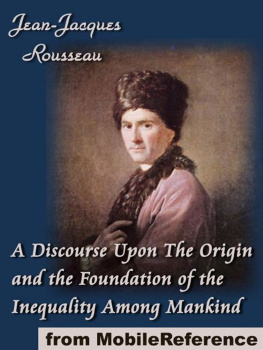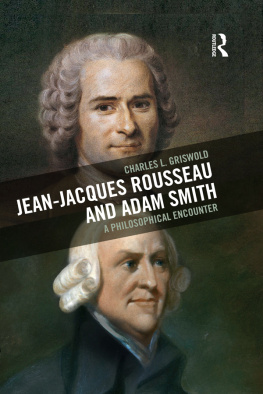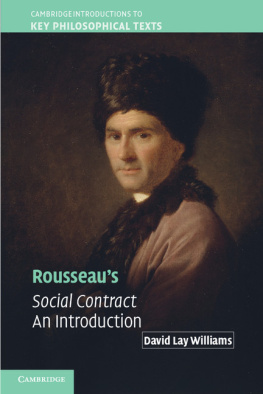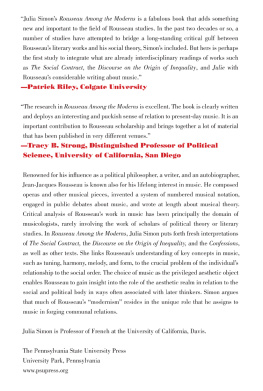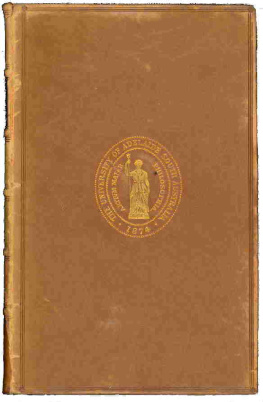
A DISCOURSE ON INEQUALITY
JEAN-JACQUES ROUSSEAU was born in Geneva in 1712. Abandoned by his father at the age of ten he tried his hand as an engravers apprentice before he left the city in 1728. From then on he was to wander Europe seeking an elusive happiness. At Turin he became a Catholic convert, and as a footman, seminarist, music teacher or tutor visited many parts of Switzerland and France. In 1732 he settled for eight years at Chambry or at Les Charmettes, the country house of Madame de Warens, remembered by Rousseau as an idyllic place in the Confessions. In 1741 he set out for Paris, where he met Diderot, who commissioned him to write the music articles for the Encyclopdie. In the meantime he fathered five children by Thrse Levasseur, a servant girl, and abandoned them to a foundling home. The 1750s witnessed a breach with Voltaire and Diderot, and his writing struck a new note of defiant independence. In his Discours sur les sciences et les arts and the Discours sur lorigine de lingalit he showed how the growth of civilization corrupted natural goodness and increased inequality between men. In 1758 he attacked his former friends, the Encyclopaedists, in the Lettre dAlembert sur les spectacles which pilloried cultured society. In 1757 he moved to Montmorency and these five years were the most fruitful of his life. His remarkable novel La Nouvelle Hloise (1761) met with immediate and enormous success. In this and in mile, which followed a year later, Rousseau invoked the inviolability of personal ideals against the powers of the state and the pressures of society. The crowning achievement of his political philosophy was The Social Contract, published in 1762. That same year he wrote an attack on revealed religion, the Profession de foi du vicaire savoyard. He was driven from Switzerland and fled to England, where he succeeded only in making an enemy of Hume and returned to his continental peregrinations. In 1770 Rousseau completed his Confessions. His last years were spent largely in France, where he died in 1778.
MAURICE CRANSTON was born in London in 1920 and was educated at London University and St Catherines College, Oxford. For twenty-six years he was Professor of Political Science at the London School of Economics. He also held a number of visiting professorships and was a former President of the Institut International de Philosophie Politique. His 1957 biography of John Locke remains the definitive study of Lockes life. His many other books include Human Rights Today, The Mask of Politics and Philosophers and Pamphleteers: Political Theorists of the French Enlightenment, as well as two translations of Rousseaus works, The Social Contract and A Discourse on Inequality, both published in Penguin Classics. More recently his two volumes of biography on Rousseau, Jean-Jacques: the Early Life and Work of Jean-Jacques Rousseau 17121754 and The Noble Savage appeared to great critical acclaim. He was working on a third volume at the time of his death in 1993.
Jean-Jacques Rousseau

A DISCOURSE ON INEQUALITY
TRANSLATED
WITH AN INTRODUCTION
AND NOTES BY
MAURICE CRANSTON

PENGUIN BOOKS
PENGUIN BOOKS
Published by the Penguin Group
Penguin Books Ltd, 80 Strand, London WC2R 0RL, England
Penguin Putnam Inc., 375 Hudson Street, New York, New York 10014, USA
Penguin Books Australia Ltd, 250 Camberwell Road, Camberwell, Victoria 3124, Australia
Penguin Books Canada Ltd, 10 Alcorn Avenue, Toronto, Ontario, Canada M4V 3B2
Penguin Books India (P) Ltd, 11 Community Centre, Panchsheel Park, New Delhi 110 017, India
Penguin Books (NZ) Ltd, Cnr Rosedale and Airborne Roads, Albany, Auckland, New Zealand
Penguin Books (South Africa) (Pty) Ltd, 24 Sturdee Avenue, Rosebank 2196, South Africa
Penguin Books Ltd, Registered Offices: 80 Strand, London WC2R 0RL, England
www.penguin.com
This translation first published 1984
28
Copyright Maurice Cranston, 1984
All rights reserved
Except in the United States of America, this book is sold subject to the condition that it shall not, by way of trade or otherwise, be lent, re-sold, hired out, or otherwise circulated without the publishers prior consent in any form of binding or cover other than that in which it is published and without a similar condition including this condition being imposed on the subsequent purchaser
CONTENTS
FOREWORD
THIS translation is based on the text published by Marc-Michel Rey in 1755. Additional material which appeared in the Moulton-Du Peyrou edition of 1782 is printed in footnotes marked by an asterisk. The original MS. used by Rey has been lost, as has the manuscript submitted by Rousseau to the Academy of Dijon; only a few fragments of an earlier draft of the Discourse survive.
INTRODUCTION
ROUSSEAUSDiscourse on the Origins of Inequality is dedicated to the sovereign citizens of Geneva, and pays homage to that republic in language which some readers have considered suspiciously fulsome. Rousseau describes his native city-state as a republic ideal in size, a place where no man is above the law, where age and experience have mellowed the constitution and where the right to legislate belongs to all the citizens:
The more I reflect on your civil and political arrangements the less can I imagine that the nature of human contrivance could produce anything better Your happiness is already achieved, you have only to know how to be satisfied with it You have no masters other than wise laws made by yourselves and administered by upright magistrates of your own choosing.
These words may well sound strange to anyone familiar with Rousseaus Letters from the Mountains in which he describes the regime in Geneva as an odious and lawless despotism, but it must be remembered that Rousseau wrote these Letters when he was aged fifty-two, in 1764, after he and his books had been outlawed by the authorities of Geneva, and after he had been amply briefed on the politics of Geneva by opponents, both moderate and radical, of the regime. Up to the age of forty-two, when he wrote his Discourse on Inequality, he was an uncritical patriot.
Geneva in 1712, when Rousseau was born there, was a singular political entity. With an entire population of little more than 25,000, it had been an independent nation for more than a century and a half, one of the few surviving city-states in an age of great kingdoms and royal absolutism. Although it was not an ancient republic like Venice or San Marino, or even a Free City within the Holy Roman Empire, the burghers of Geneva had already in the Middle Ages exploited the rivalry between their two feudal masters, the Bishops and secular lords of Geneva to secure themselves a large measure of civil autonomy. At the beginning of the fifteenth century when their secular lords, the Earls of Savoy, became Dukes and made strenuous efforts to assert their sovereignty in Geneva at the expense of the Bishop, the Bishop made correspondingly generous offers to the burghers to win their support against the Duke. They backed him in return for a contract which recognized their General Council the public assembly to which every citizen belonged as the central legislative body of the city. Thus, Geneva, while still a municipality, acquired the structures and some of the political experience on which an independent republic could be built.
Next page
